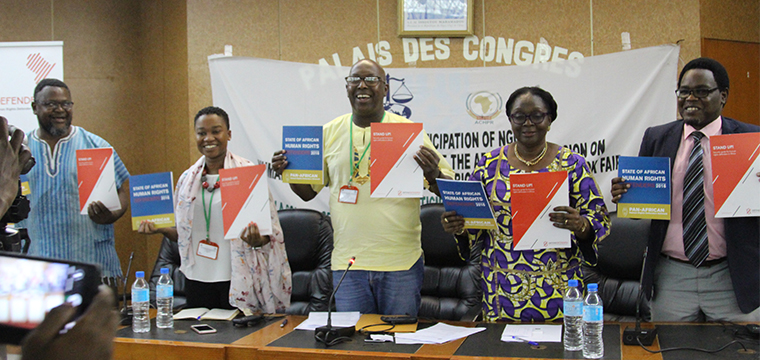On 5 May 2017, at the NGO forum preceding the 60th session of the African Commission on Human and Peoples’ Rights, DefendDefenders launched “Stand Up!”, a new organisational and personal security manual to help human rights defenders (HRDs) do their work in a safe and effective manner.
In December 2019, we launched the “Stand Up!” in four Ugandan local languages, namely Acholi, Ateso, Luganda, and Runyakitara.
Throughout the continent, our rights are being infringed upon and restricted at alarming speed. HRDs often place themselves in direct firing line to defend our rights to live in peace, enjoy liberty, speak freely, to live in healthy environments, to enjoy democratic processes: in short to enjoy the promises made in the Universal Declaration of Human Rights.
But these rights are not claimed easily in Africa. HRDS across the continent are threatened, harassed, imprisoned, displaced, and even killed because of their convictions and the work they do challenging the status quo.
“DefendDefenders was founded to protect HRDs from immediate risks. However, a decade of experience has taught us that much can be done to prevent them from reaching this critical point,” said Hassan Shire, Executive Director. “By carefully considering their safety, developing strong security plans, and rigidly adhering to them, even HRDs working in extreme conditions can mitigate the risk they face as individuals and organisations.”
“Stand Up!” helps defenders to reduce the risks inherent in achieving their goals. They can use it to better understand the opposing and supporting factors in their environment, identify their vulnerabilities, and create new capacities to stand up to adversity.
Book One covers personal, physical, and organisational security planning. HRDs can learn the essential framework for security analysis and planning as well as the support mechanisms available at the regional and international level for human rights defenders.
Book Two covers digital security for electronic devices, and online accounts and communications. It extends the lessons of security management into the digital realm with risk assessment of electronic workspaces and the essential steps to secure human rights work when its conducted from phones, computers, email, websites, social media accounts and more.
Through the recommendations in these two books, HRDs can enhance their own security and help their colleagues and communities to do the same. If taken at heart, these lessons will translate into tangible results in the form of more safety consciousness, better communication and planning within communities of human rights defenders, and robustness of response when threats do manifest themselves.

